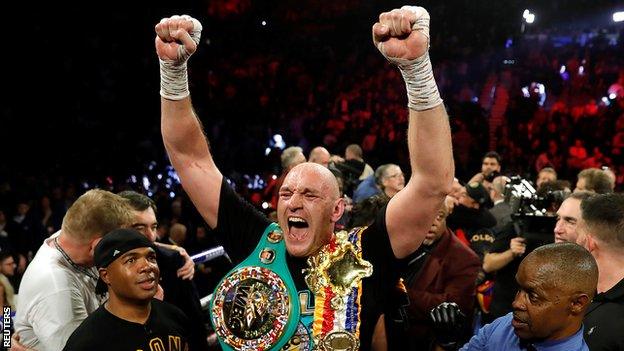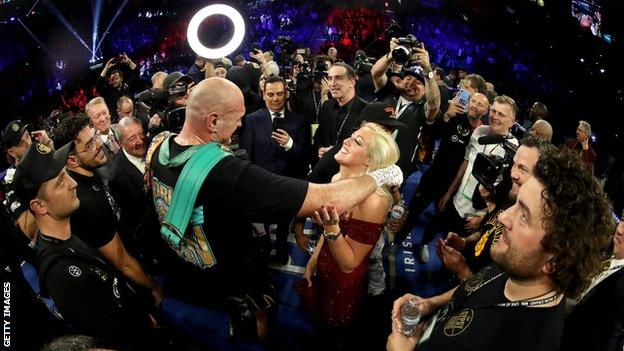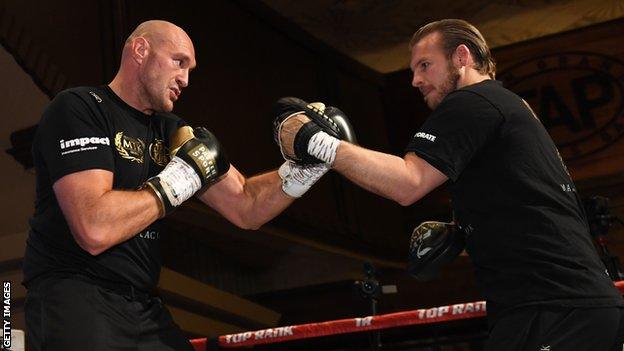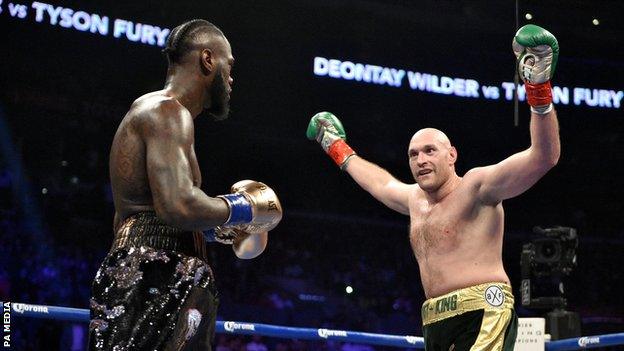Tyson Fury: Five things we learned about 'The Gypsy King'
- Published

Fury had TV cameras follow him in his bid to return to the top of boxing
A father's guiding hand, a wife's endless support and habitual trips to the rubbish tip have helped Tyson Fury reclaim his place back at the top of the boxing mountain.
The 31-year-old British heavyweight ripped the WBC world heavyweight title from Deontay Wilder on 22 February in the latest twist since his comeback to the sport following 30 months on the sidelines battling a litany of personal problems.
An all-access documentary filmed by ITV has charted some of the 20 months since Fury returned to the ring and embarked on his world-title crusade.
Here are five things 'The Gypsy King' captured.
Dad's the word
Fury's decision to split from Ben Davison two months before his February rematch with Wilder raised eyebrows. Many pointed to criticism of trainer Davison by Fury's father John as the catalyst.
Fury's father said his son had been too light in the ring and it is clear the fighter listens to no-one in the same way he does his dad.
Moments after beating Wilder, Fury shared an emotional phone call with his father - who is unable to visit America due to a previous conviction - and pointing back to the weight issue, said: "I was too strong for him dad. I was 19st 4lbs tonight, solid."
John Fury replied: "You're the best fighting man I have ever seen in my whole entire life. It was a masterclass, the best I have ever, ever seen in my life. Let me tell you son, it was some performance and I'm still shaking. Love you son."
The fear of a quiet day
Fury's life since his return to boxing has been chaotic.
He has had six fights in 20 months, made an appearance in WWE, released a book, embarked on a speaking tour and been part of ITV's popular documentary.
He states he suffers with depression, anxiety, bi-polar disorder and obsessive-compulsive disorder.
Scheduled tasks like shaving his head or taking rubbish to the tip are used to maintain the routine he says he needs and generally keeping moving is key in ensuring the debilitating effects of mental health issues do not reappear.
"My problem is I can't relax and switch off," he says. "I like to keep busy because when I am not busy, if I have too much time on my hands I start getting down.
"I train six days a week and take Sundays off. Make no mistake, Sunday is a terrible day for me."
'Paris is owed everything'
"I created the monster," said Fury's wife Paris as she described encouraging him to come out of his shell during his teenage years.
Fury credits Paris and his aunt Ramona as the two people who told him to stop hunching over to hide his height in his younger years.
And behind-the-scenes access has shown Paris is key in keeping the Fury juggernaut moving as she spends long spells looking after their five young children while her husband is in training camps.
She said: "My role is to be doctor, nurse, cook, cleaner, mother, father when he's not here and house organiser. Rolled down into one title, that's mam."
It does not go unnoticed as Fury said: "When I was in hospital she was there, when I was ill she was there. I owe her everything."

Tyson and Paris Fury have been married since 2008
No bad blood and a Davison return?
Rarely in boxing do splits between fighters, trainers, promoters or anyone for that matter end nicely.
Fury's parting of ways with Davison is a rare exception. The pair are still texting one another and remain close.
"It was an emotional conversation for both of us," Davison said when recalling the moment they split.
"We are friends as well as having had a coach and fighter relationship. I want what is best for him."
Some close to Fury in Las Vegas before his Wilder win even said Davison could one day return to the team.
Davison deserves immense credit for rebuilding Fury from the troubled, 28st fighter he inherited. At one point he moved in with him in order to help keep his mind on a comeback.
His work has been recognised and endorsed in the finest possible way, as world champions Billy Joe Saunders and Josh Taylor have both now recruited him to guide them in the ring.

Fury in the ring with former trainer Ben Davison before he beat Tom Schwarz in 2019
This time it's different.
Drugs, alcohol, binge eating, a UK Anti-Doping case, depression, panic attacks and controversial public comments became part of Fury's life after he first became a world champion in 2015.
His belts were given up outside the ring and now belong to his compatriot Anthony Joshua, whose career sky-rocketed while Fury rebuilt in the face of comments from countless boxing names who thought he had simply fallen too far.
He made it back to the top, hammering away to stop Wilder in seven rounds to become a world champion again.
After his first world title, Fury openly said he felt he was not given the credit he deserved, prompting some angry outbursts. Now it seems he has found contentment within his own achievement.
"When you achieve your dreams you look back off the mountain top and realise every step I ever made, every move I made, it was worth it," he said.
- Published29 November 2021
